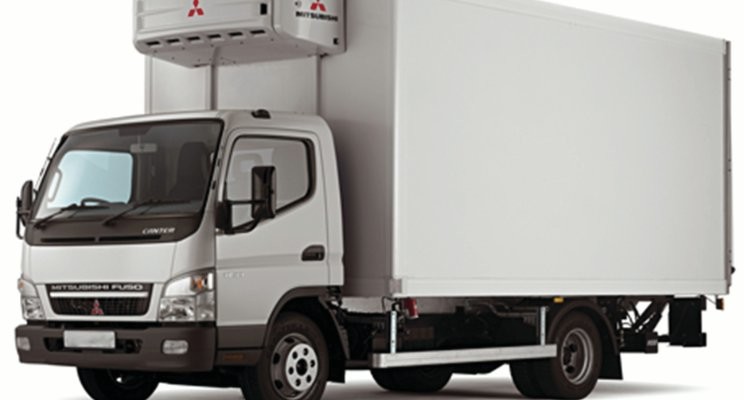Specialist Tips for Selecting the very best Refrigerated Truck Companies
Specialist Tips for Selecting the very best Refrigerated Truck Companies
Blog Article
A Comprehensive Review of the Devices Behind Refrigerated Truck Transportation and Its Duty in Food Security
Cooled vehicle transport is important in maintaining food safety, employing sophisticated temperature level control mechanisms and insulation modern technologies to protect perishable products throughout transit. The assimilation of innovative tracking systems ensures real-time oversight, enabling prompt treatment in the event of temperature discrepancies. These important components not only protect the honesty of food products however likewise play an important duty in preventing foodborne diseases. Recognizing exactly how these mechanisms function together elevates vital inquiries about their performance and prospective areas for enhancement within the market. What ramifications do these aspects have for the future of food security?
Importance of Refrigerated Transportation
Refrigerated transport plays a crucial duty in keeping the stability and safety of subject to spoiling products throughout the supply chain (refrigerated truck companies). This specialized logistics system is essential for preserving the high quality of food products, including fresh produce, dairy products items, meats, and fish and shellfish, which are vulnerable to spoilage when exposed to temperature fluctuations. The ability to preserve a regulated and regular atmosphere makes certain that these items retain their dietary value, taste, and safety and security for customers
In addition, chilled transportation reduces the dangers of foodborne illnesses, which can develop from the growth of hazardous germs in improperly stored items. By adhering to rigorous temperature needs, businesses not only comply with regulatory requirements yet also foster consumer trust fund and brand reliability. The economic ramifications are considerable; minimized wasting prices convert to reduced losses for suppliers and stores, contributing to overall earnings.
In addition, the enhancing global demand for top quality and fresh foodstuff further stresses the value of chilled transport. As supply chains become more complex and expand globally, the requirement for efficient temperature-controlled logistics remains to grow, underpinning the whole food circulation network and guaranteeing that perishable items reach their destinations safely and successfully.
Temperature Control Devices
Keeping ideal temperature control is vital in the transportation of perishable goods, and a selection of devices are utilized to accomplish this objective. Cooled trucks use sophisticated refrigeration systems, mostly utilizing vapor compression modern technology, which circulates refrigerant with evaporator and condenser coils to extract warmth from the freight location. This procedure makes sure that the inside remains consistently awesome, thereby preserving the quality and security of the items being transported.
Additionally, vehicles are furnished with temperature level surveillance systems that supply real-time information on the inner environment. These systems frequently include digital sensing units and alarm systems to sharp operators in situation of temperature level fluctuations, allowing immediate rehabilitative activities. Some cooled trucks additionally feature programmable temperature setups, enabling accurate control customized to specific kinds of cargo, such as fruits, veggies, or drugs.
Additionally, making use of pre-cooling techniques before loading boosts the performance of temperature level control. By lowering the cargo area's temperature level prior to the intro of items, the danger of temperature spikes during transport is lessened. These devices jointly add to a dependable cool chain, crucial for keeping the stability and security of subject to spoiling food items throughout the transport process.
Insulation Technologies
Insulation innovations play a critical duty in boosting the effectiveness of refrigerated vehicle transportation by decreasing thermal exchange between the freight area and the external environment. Efficient insulation is essential for preserving the called for temperature for perishable goods, consequently guaranteeing food safety and top quality during transportation.
Typical insulation materials used in chilled vehicles consist of polyurethane foam, polystyrene, and fiberglass, each offering differing levels of thermal resistance. Polyurethane foam, understood for its premium protecting homes, is frequently used as inflexible panels that can be formed to fit the truck's inside. Polystyrene provides a light-weight option while still giving adequate thermal protection. Fiberglass, although less typical, can be reliable in particular applications as a result of its toughness and resistance to wetness.

Advanced Surveillance Equipment
To make sure the honesty of perishable items throughout transportation, advanced tracking Read More Here systems have actually become a pivotal development in the chilled truck industry - transport refrigeration company. These systems utilize a combination of sensors, data loggers, and real-time tracking technologies to continuously monitor temperature level, humidity, and overall freight conditions throughout the journey. By supplying instantaneous comments on environmental variables, these systems permit prompt corrective actions, consequently securing product quality
Modern keeping an eye on systems are outfitted with wireless connection, enabling smooth information transmission to logistical centers and stakeholders. This connection promotes remote monitoring, which is necessary for maintaining conformity with sector regulations and standards. Alerts can be generated in real-time, alerting operators of any inconsistencies from pre-set thresholds, thus minimizing the risk of perishing.
In addition, the assimilation of sophisticated analytics and machine knowing formulas boosts anticipating capacities, enabling better planning and threat evaluation. Historic information accumulated from these systems can inform future transport techniques, maximizing paths and lowering possible dangers. On the whole, the deployment of advanced monitoring systems represents a significant development in the refrigerated transportation field, reinforcing the commitment to protecting the quality and security of subject to spoiling items throughout their trip.
Influence On Food Security Criteria
The integration of sophisticated surveillance systems in chilled vehicle transport has dramatically influenced food security requirements across the supply chain. These systems allow real-time monitoring of temperature level, moisture, and various other vital specifications necessary for preserving the integrity of perishable goods. By making certain that products remain within specified temperature arrays during transportation, these technologies alleviate the risk of microbial growth and putridity, which are essential in food safety.

The fostering of information analytics additionally allows for proactive decision-making, allowing companies to determine potential concerns prior to they escalate right into food safety and security violations. Because of this, the incorporation of innovative surveillance systems not just improves functional effectiveness however additionally fosters greater liability in the food supply chain. This evolution underscores the essential function of innovation in boosting food safety standards and guaranteeing customer confidence in the products they get.
Verdict
Finally, cooled vehicle transportation is essential for preserving food security with efficient temperature level control, advanced insulation modern technologies, and constant surveillance systems. These systems function synergistically to click now preserve the high quality of subject to spoiling items and reduce the threat of foodborne diseases. Adherence to rigid food security requirements is achieved with the application of these modern technologies, highlighting the crucial function of chilled transport in the food supply chain and its influence on public health.
Chilled truck transport is vital in keeping food safety, employing innovative temperature control devices and insulation innovations to protect disposable goods throughout transportation - transport refrigeration companies. Correct upkeep of insulation stability, including routine checks for wear or damage, is additionally essential to sustain the performance of refrigerated transport systems and ensure conformity with food security regulations
The assimilation of sophisticated tracking systems in chilled truck transportation has actually significantly influenced food security criteria across the supply chain.In final thought, cooled truck transport is necessary for preserving food security with effective temperature control, advanced insulation modern technologies, and constant tracking systems. Adherence to rigorous food safety standards is attained through the implementation of these technologies, highlighting the vital duty of cooled transport in the food supply chain and its impact on public wellness.
Report this page